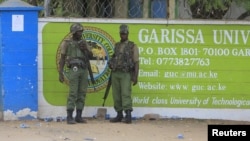A Kenyan court Wednesday sentenced three men connected to the deadly 2015 assault on Garissa University that killed 148 people, most of them students.
Kenya's Chief Magistrate Court sentenced a Tanzanian man to life in prison in connection with the April 2, 2015, attack. Two Kenyans received sentences of 41 years. All three were convicted of playing supporting roles in the attack, for which al-Shabab militants claimed responsibility.
Two survivors who spoke to VOA say the sentences brought them no closure.
Elizabeth Wamboi, 25 years old, survived the early morning attack. She continued her education afterward, but transferred to another university.
Wamboi told VOA she has found it difficult to go on with her life, although she has forgiven those who killed her fellow students.
"Only what I feel now so much loss," she said. "There is nothing I can do about it. I lost very close friends, a boyfriend, but I already forgave and moved on, and there is nothing much I can do."
Another survivor, Nicholaus Odhiambo, says the verdicts had no effect on him.
"I cannot say I was relieved because it has already happened and I have lost a lot of friends," he said. "There is nothing that could have been done to bring them back. I felt nothing. Simply put, nothing."
The university was closed for nine months after the attack, but reopened the following year and produced its first new graduates in June.
Ahmed Ismail survived the deadly siege and graduated from the university.
He says the students' will to get an education has defeated al-Shabab's terror threats.
"Terrorism is a global problem. Just that Garissa University, we were unfortunate they targeted us, and you know terrorist have no rules. We have told terrorists, we have shown Kenya, Africa, and the world [that] Garissa University will not fail, irrespective of who attacks and who does what," he said. "We have carried out from scratch and now we are happy that we are graduates from the very university terrorists wanted it closed."
The town of Garissa is about 200 kilometers (124 miles) from the Somalia border and, in recent years, has been the site of sporadic attacks blamed on al-Shabab. The group has targeted Kenya for sending troops into Somalia to support the internationally recognized government.





